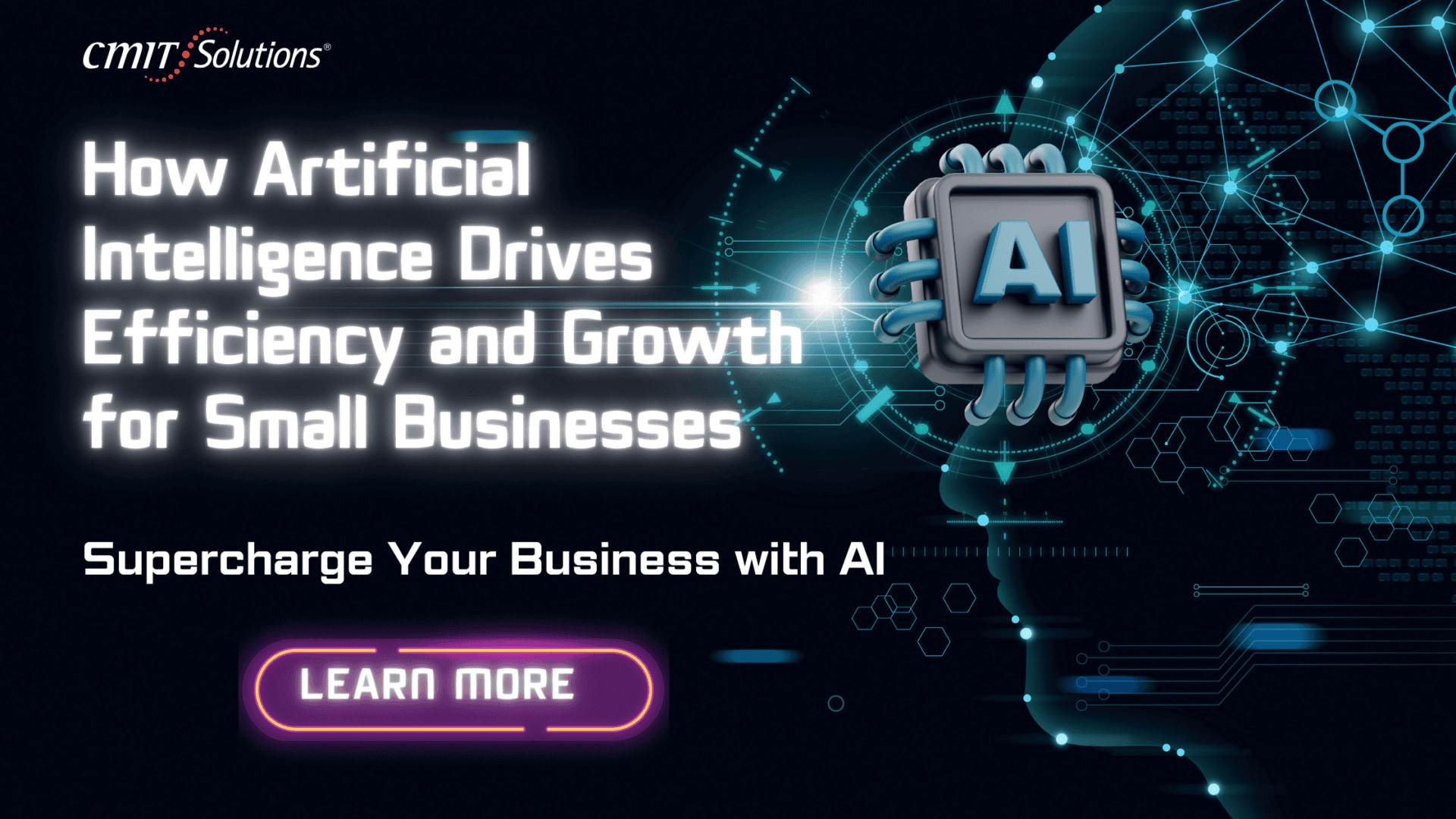- AI automates repetitive tasks like customer inquiries, bookkeeping, and scheduling, allowing small businesses to save time and focus on strategic activities.
- AI-powered tools analyze data to enhance decision-making, improve customer service, personalize marketing, and optimize inventory and supply chains.
- Affordable, user-friendly AI tools enable small businesses to streamline operations, reduce costs, and compete effectively in a competitive market.
Small businesses constantly look for ways to do more with less in today’s increasingly competitive market. Limited budgets, small teams, and increasing customer expectations make efficiency a top priority. This is where artificial intelligence (AI) steps in as a practical and accessible solution for businesses of all sizes. Once considered the domain of large corporations, AI has now become a tool that small businesses can use to reduce costs, improve operations, and grow faster than ever before.
By automating repetitive tasks, analyzing data, and delivering customer insights, AI is no longer a futuristic concept; it’s a practical tool shaping how businesses operate. But how exactly can small businesses use it to their advantage?
AI Opportunities for Small Businesses
Let’s explore how AI drives efficiency and growth across key areas in a small business.
Automating Time-Consuming Tasks
One of the simplest ways AI benefits small businesses is through automation. Many tasks that once required manual effort, such as data entry, scheduling, or customer communication, can now be handled by AI-powered tools.
For example, chatbots can handle customer inquiries 24/7, reducing the need for staff to respond manually to common questions. Tools like QuickBooks or Xero use AI to automate bookkeeping, categorizing transactions, and generating financial reports with minimal input. Similarly, AI-powered scheduling tools like Calendly can manage appointments, saving hours of back-and-forth communication.
By automating these tasks, small businesses can free up their employees to focus on higher-value work, like building relationships with customers or developing new products.
Improving Customer Service
AI has revolutionized customer service by making it faster and more personalized. Chatbots, for instance, provide instant responses to customer inquiries, resolving issues without delays. Advanced AI tools can even analyze customer interactions to identify pain points and recommend solutions.
These tools can also personalize customer interactions. For example, recommendation systems, like those used by e-commerce platforms, analyze customer preferences to suggest products or services tailored to their needs. This level of personalization enhances the customer experience and increases the likelihood of repeat business.
Sentiment analysis tools are another way AI supports customer service. These tools analyze customer feedback, such as reviews or social media posts, to understand customer satisfaction and highlight areas for improvement.
Optimizing Marketing Efforts
Marketing is essential for small businesses, but it often requires significant time and resources. This technology can streamline marketing efforts by analyzing data and providing actionable insights.
AI-powered platforms like Google Analytics or HubSpot can track customer behavior and identify trends, helping businesses understand their audience better. With this information, small businesses can create targeted marketing campaigns that are more likely to succeed.
Additionally, AI tools can help with tasks like email marketing, social media posting, and ad management. For instance, tools like Mailchimp or Hootsuite use the technology to optimize the timing and content of campaigns, ensuring they reach the right audience at the right time.
Predictive analytics is another powerful feature of AI in marketing. By analyzing past data, it can predict future trends, enabling businesses to make data-driven decisions about product launches, pricing strategies, and promotional activities.
Streamlining Inventory and Supply Chain Management
For businesses that sell physical products, managing inventory and supply chains can be a major challenge. AI can simplify this process by providing accurate demand forecasts and real-time inventory tracking.
The tools analyze sales data, market trends, and seasonal patterns to predict future demand. This helps businesses maintain optimal inventory levels, avoiding both overstocking and stockouts. Also, AI-powered supply chain tools can identify bottlenecks or inefficiencies, allowing SMBs to address issues before they escalate.
For example, platforms like TradeGecko and Skubana use AI to track inventory, process orders, and suggest reordering schedules, ensuring smooth operations and satisfied customers.
Enhancing Decision-Making with Data
Small businesses often struggle to make informed decisions due to a lack of data or the inability to analyze it effectively. AI changes this by processing large volumes of data quickly and providing actionable insights.
AI-powered analytics tools can identify patterns and trends that might not be obvious through manual analysis. For example, businesses can use tools like Tableau or Power BI to visualize data and gain deeper insights into sales, customer behavior, and market trends.
These insights enable small businesses to make better decisions about pricing, product offerings, and resource allocation. Additionally, real-time analytics makes sure that enterprises can adapt quickly to changing conditions, whether it’s a sudden shift in customer preferences or a new competitor entering the market.
Reducing Operational Costs
One of the most significant benefits of AI is its ability to reduce costs. By automating tasks, optimizing processes, and improving decision-making, AI allows small businesses to operate more efficiently.
For example, AI-powered energy management systems can monitor and optimize energy usage, reducing utility bills. Predictive maintenance tools can alert businesses to equipment issues before they become costly repairs.
Moreover, AI can help them reduce labor costs without compromising quality. Automated customer service, marketing, and administrative tasks allow small teams to achieve more, enabling businesses to grow without a proportional increase in expenses.
Improving Hiring and HR Processes
Recruiting and managing employees can be time-consuming, especially for small businesses with limited HR resources. This technology can streamline the processes by performing resume screening, scheduling interviews, and even providing initial assessments of candidates.
AI-powered HR tools like Workable or BambooHR analyze resumes for keywords and qualifications, ensuring that only the most suitable candidates move forward in the hiring process. Similarly, AI chatbots can handle routine HR inquiries, such as questions about leave policies or payroll, freeing up HR staff for more complex tasks.
Employee engagement tools powered by AI can also analyze survey data and provide recommendations to improve workplace satisfaction, helping small businesses retain top talent.
Strengthening Cybersecurity
Cybersecurity is a critical concern for small businesses, as they are increasingly targeted by cyberattacks. Limited resources often make it challenging for smaller organizations to maintain strong defenses. AI provides an effective and affordable way to improve cybersecurity and protect sensitive data.
AI-powered cybersecurity tools can detect and respond to threats faster than traditional methods. For instance, tools like Darktrace and CrowdStrike use machine learning to identify unusual patterns or behaviors that may indicate a cyberattack. These systems work in real-time, enabling businesses to respond to threats before they cause significant damage.
Phishing is a common threat faced by small businesses. AI email filters can analyze incoming messages and detect signs of phishing or malicious intent, reducing the risk of employees falling victim to scams. Similarly, AI-powered firewalls and antivirus software can provide continuous protection against malware and unauthorized access.
By incorporating AI into their cybersecurity strategies, SMBs can protect their digital assets, build customer confidence, and ensure uninterrupted operations.
Increasing Accessibility of Advanced Tools
AI technology is no longer out of reach for small businesses. Many AI-powered tools are available as affordable, subscription-based services, requiring little to no technical expertise. Cloud-based platforms have made it easier than ever to access advanced AI capabilities without investing in expensive infrastructure.
For example, small businesses can use AI tools like Grammarly for writing assistance, Canva for graphic design, and Zapier for automating workflows—all at a fraction of the cost of hiring specialists or purchasing advanced software.
This accessibility helps even the smallest businesses benefit from AI, leveling the playing field and allowing them to compete with larger organizations.
Addressing Common Concerns About AI
While AI offers numerous benefits, many small business owners worry about the cost, complexity, and potential job displacement associated with its adoption. However, these concerns can often be addressed with the right approach.
Many AI tools are designed with user-friendliness in mind, requiring no technical expertise to implement or operate. Additionally, most tools offer flexible pricing plans, allowing businesses to scale their usage as needed.
As for job displacement, AI often complements human workers rather than replacing them. It allows employees to focus on more meaningful and strategic work by handling repetitive or time-consuming tasks, ultimately enhancing productivity and job satisfaction.
The Future of AI for Small Businesses
As AI technology continues to evolve, its potential for small businesses will only grow. Emerging trends like generative AI, conversational AI, and edge computing are expected to make it even more accessible and impactful in the coming years.
By embracing AI today, small businesses can stay ahead of the curve and position themselves for long-term success. From improving efficiency to driving growth, AI is no longer a luxury—it’s a necessity for businesses looking to thrive in a competitive market.
How to Get Started with AI
If you’re a small business new to AI, a step-by-step approach ensures successful adoption and tangible benefits:
Identify Areas of Impact
Start by identifying specific areas where AI can deliver the most immediate value. Look closely at repetitive, time-consuming tasks in your operations, such as data entry, scheduling, customer communication, or inventory management.
These areas are often ripe for automation and can quickly demonstrate how AI can save time and resources. Similarly, pinpoint operational pain points that frequently slow down productivity or lead to inefficiencies, as addressing these issues can provide tangible benefits right away.
Research Suitable Tools
Once you’ve identified the areas where AI could help, invest time in researching tools tailored to your specific needs. For example, if you struggle with customer support, explore AI-powered chatbots that handle inquiries seamlessly. If managing your social media is a challenge, look into content scheduling platforms with AI features to optimize your campaigns.
Many AI tools cater specifically to small businesses, offering scalable solutions that don’t require large budgets or technical expertise. Most platforms also provide free trials or demo versions, allowing you to test their functionality before making a financial commitment. This “try-before-you-buy” approach ensures that you can assess a tool’s impact on your business operations without unnecessary risk.
Train Your Team
As you integrate AI tools, don’t overlook the importance of preparing your team. Even user-friendly AI solutions require basic understanding and training to maximize their potential. Make sure that your employees are comfortable using the tools by providing hands-on training sessions or workshops.
Many AI platforms come with built-in tutorials, step-by-step guides, or dedicated customer support services to assist new users. Taking advantage of these resources will help your team adapt more quickly and confidently to the new systems.
Start Small and Scale Gradually
By starting small, focusing on the most impactful areas, and equipping your team with the knowledge they need, you can ensure a smooth and successful adoption of AI. This measured approach reduces risk and allows you to see tangible benefits early in your AI journey.
Unlock the power of AI and tailored IT solutions to optimize operations, enhance customer experiences, and protect your business from cyberthreats. At CMIT Solutions of Fort Lauderdale, we specialize in affordable, cutting-edge tools designed specifically for small businesses. Contact us today for a consultation and take the first step toward a smarter, more secure future.





